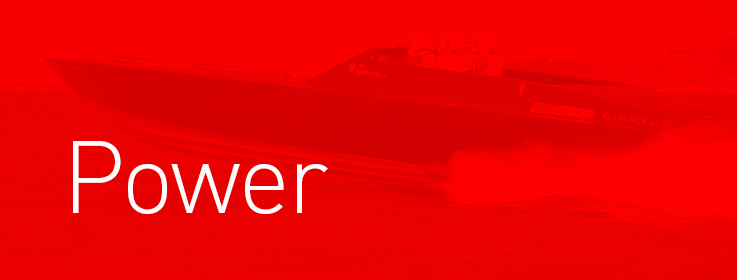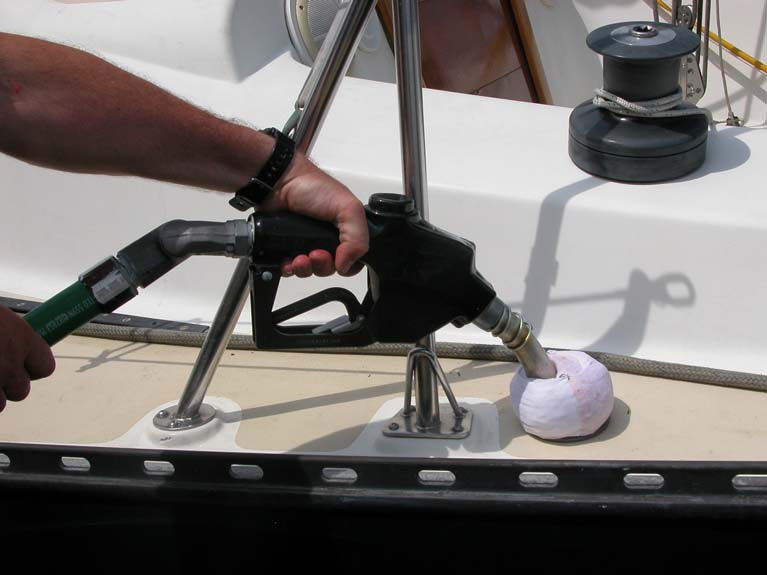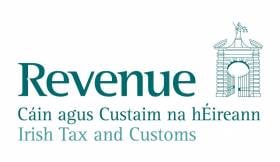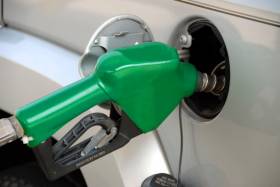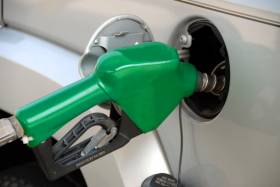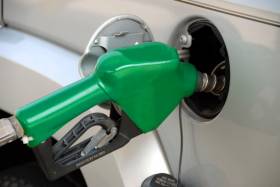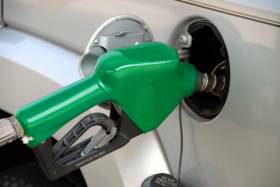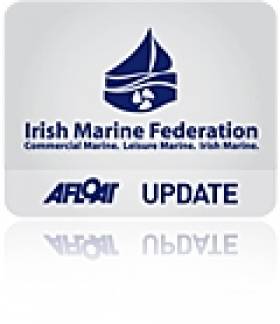Displaying items by tag: green diesel
If green diesel is found by the Revenue Commissioners in the fuel tank of a private pleasure craft during the early part of 2020, the owner of the craft may be liable for prosecution unless he or she can demonstrate clearly that the diesel is a residue from 2019, and that the boat has not been used in 2020 up to that point where the residue of MGO was detected.
It follows a situation in the marketplace this Spring where some resellers are reported to be continuing to sell green diesel to pleasure craft despite a ban in force since January 1.
As Afloat reported previously, In October 2019, the Department of Transport, Tourism and Sport informed the public of the Department of Finance's intention to change the law regarding the use of Marked Gas Oil for Private Pleasure Navigation from 1 January 2020.
Fuel used for private pleasure navigation has, since 2008, been liable to Mineral Oil Tax (MOT) at the standard rate for diesel used as a propellant (‘white diesel’). The reduced rate of MOT charged for green diesel (Marked Gas Oil/MGO) has not applied to fuel used for private pleasure navigation since a derogation under the Energy Tax Directive, allowing Ireland apply a reduced tax rate for fuel used for such purposes, came to an end in 2008.
When the derogation came to an end, arrangements were provided for in national legislation to permit owners of private pleasure craft to use MGO on condition that they made an annual declaration of usage to Revenue and submitted a balancing payment representing the difference between the MOT they would have paid had they have purchased the same quantity of white diesel and the MOT they actually paid when purchasing MGO. On 17 October 2018, these arrangements were found by the European Court of Justice to be in breach of the Fiscal Marking and Energy Tax Directives.
Ireland accepted the CJEU ruling and informed the Commission that the necessary legislative changes would be brought forward in the Finance Bill 2019. In October 2018 the Department of Finance informed the relevant State authorities of the ruling, its import and the timeline for its implementation so that they could consider what issues, if any, needed addressing from their perspective.
In December 2018, Waterways Ireland published Marine Notice 132 of 2018 informing owners of private pleasure craft of the import of the CJEU ruling and the implementation timeline set out by the Department.
In November 2019 the Department of Transport, Tourism and Sport published a further notice, Marine Notice 52 of 2019, informing the public of upcoming changes to the law regarding the use of Marked Gas Oil for private pleasure navigation from 1st January 2020.
Section 41 of the Finance Act 2019 came into legal effect from 1 January 2020. The net result of the legal changes made is that the special arrangements, permitting the use of MGO for private pleasure navigation on condition of submitting an annual return and payment of MOT due, came to an end.
The use of MGO is no longer permitted for private pleasure navigation and unmarked, duty paid diesel must be used for such purposes. In addition, the supply of MGO for use in private pleasure navigation is no longer permitted. Revenue’s website has been updated accordingly and more detailed information will be published over the coming weeks. It should be noted that the legislative changes do not impact on the operation of the relief from MOT for fuel used for commercial sea navigation, including commercial fishing.
Owners of private pleasure craft who purchased MGO for private pleasure navigation in 2019 are required to submit a return and pay any MOT due by 1 March 2020. In relation to MGO residue remaining in the fuel tanks of private pleasure craft, Revenue will, on an operational basis, allow owners to use MGO that was in a craft’s fuel tank before the end of 2019. It is anticipated that such residue will be used up very quickly.
Revenue says they will enforce the new arrangements on a risk basis. Private pleasure craft owners must ensure that they only purchase white diesel for private pleasure navigation from 1 January 2020 onwards. If MGO is found by Revenue in the fuel tank of a private pleasure craft during the early part of 2020, the owner of the craft may be liable for prosecution unless he or she can demonstrate clearly that the diesel is a residue from 2019, and that the boat has not been used in 2020 up to that point where the residue of MGO was detected.
Revenue Guidance For Compliance With Green Diesel Ban For Pleasure Craft To Come Before New Year
The Revenue Commissioners will prepare guidance material for their website and update relevant tax and duty manuals in advance of the upcoming ban on the use of green diesel for private pleasure craft, it is understood.
That’s according to the latest Marine Notice from the Department of Transport, Tourism and Sport which reminds boaters that the use of marked gas fuel as a propellant by private pleasure craft will be prohibited from 1 January 2020.
However, as reported earlier this week, oil suppliers at ports around Ireland’s coast have yet to be formally updated as to what changes are required under the new legislation. Afloat.ie has more on the story HERE.
Revenue ‘Yet To Reveal Changes For Oil Suppliers’ Ahead Of Upcoming Green Diesel Ban
With only seven weeks until the ban on the use of green diesel for private pleasure craft comes into force, the Revenue Commissioners have yet to formally declare to oil suppliers what changes are required under the new legislation, according to Irish Sailing.
Come 1 January 2020, marked (or ‘green’) gas oil will no longer be permitted for use in private pleasure navigation, bringing Ireland into line with EU law in the wake of a ruling by the European Court of Justice last year.
The penalty for having green diesel in a pleasure boat tank could be as much as €5,000, which Irish Sailing suggests is double the average penalty for cars.
And it adds that details of the new regime — which means such vessels must be powered by unmarked or white diesel — have yet to be revealed to the leisure boating community.
“It has been pointed out to the Revenue that some boats refuel at longer than annual intervals and will therefore likely have some green in their tanks for a long time to come,” it explains.
“It is not known at this stage how this will be policed and while it is possible to measure the proportions of white/green through a test, rather than a simple colour check, it is not known what type of checks will be made — where or when.
“The enforcement may come in at the point of sale, making the providers responsible for policing the sale of green, and we have to assume that suppliers will refuse to put green diesel in a leisure vessel.”
Irish Sailing has provided a guide for leisure boaters on white diesel refuelling sites around Ireland, as compiled by Norman Kean.
As of now, the ports of Howth, Dun Laoghaire, Greystones, Crosshaven have confirmed the switch to white diesel with two or three pumps, while Kinsale will have one or two. No decision has been made at Malahide and Kilmore Quay.
Other ports will be less convenient. Carlingford, Arklow and Dingle will have white diesel in cans, though customers may have to provide the cans at Carlingford and Arklow.
Castletownbere, Bantry and Dingle will have white diesel by tanker available “in modest quantities and at relatively short notice”, as is traditionally the case for green diesel at these ports.
Elsewhere, local filling stations will be the only available source for white diesel.
Roundstone in Connemara has a filling station within 200m of the pier, but Sligo will require a 500m walk, while boaters at Killybegs will face a 2km round trip on foot to refuel.
The advice for now, Irish Sailing says, is to “keep receipts when you fill, so you that you can prove you have ‘gone white’”.
Finance Bill Confirms Mineral Oil Tax Ban On Green Diesel For Private Pleasure Craft From January
As professional services giant PwC highlights in its Budget insights summary, the Finance Bill published last Thursday introduces measures to bring Ireland in line with EU law with respect to the use of marked gas oil for private pleasure navigation.
The legislation comes in the wake of a ruling by the European Court of Justice a year ago, and confirms that recreational boaters will no longer be able to fuel with green diesel in the new year and onwards.
Changes to the law had been expected following the court’s decision, with Waterways Ireland issuing a notice to masters and owners of vessels last December.
“The impact of these changes means that there will be a prohibition on the use of marked gas oil for such private pleasure navigation from 1 January 2020. Offences and penalties applicable to the misuse of marked gas oil will now extend to private pleasure navigation,” PwC writes.
The European court found that Ireland had been infringing EU law by allowing the sale of cheaper marked fuel intended for the fishing industry to power motor yachts and other leisure craft — a situation deemed to be “fundamentally incompatible” with its directives on energy taxation.
However, as our own W M Nixon pointed out five years ago, the more pressing issue for boaters around the Irish coast is the availability — or lack thereof — of quality fuel not for the exclusive use of fishing boats.
He writes: “If we wish to develop Ireland as a cruising destination for ourselves as much as overseas visitors, some new thinking is needed on the whole area of the supply of marine diesel.”
Waterways Ireland Issues Notice Of Ban On Green Diesel For Personal Pleasure Craft From January 2020
Waterways Ireland has issued a notice for masters and owners of vessels that the Department of Finance intends changing the law regarding the use of marked gas oil, or MGO, in private pleasure craft from 1 January 2020.
The change follows the recent EU ruling against Ireland regarding the use of MGO — colloquially 'green diesel' — on pleasure craft.
The Department of Finance will propose an amendment to the Finance Act 2019, and once the amendment is enacted, the use of MGO as a propellant by private pleasure craft will be illegal. The practical repercussions of this are that private pleasure craft will need to use standard auto diesel as a propellant.
EU Directive 2003/96 defines “private pleasure craft” as “any craft used by its owner or the natural or legal person who enjoys its use either through hire or through any other means, for other than commercial purposes and in particular other than for the carriage of passengers or goods or for the supply of services for consideration or for the purposes of public authorities.”
In simple terms, the change to the law means that private and hired pleasure craft operating in the Republic of Ireland must use auto diesel from 1 January 2020. Commercial and public authority craft are exempt from the requirement.
Waterways Ireland says further information can be obtained from the Office of the Revenue Commissioners.
No More Green Diesel For Irish Leisure Boaters, EU Court Rules
#GreenDiesel - Recreational boaters in Ireland face an end to fuelling with green diesel, following a ruling by the European Court of Justice.
According to the Irish Examiner, Ireland has been infringing EU law by allowing the sale of cheaper marked fuel meant for fishing vessels to power yachts and other leisure craft.
Now the EU has determined that the current situation is “fundamentally incompatible” with its directives on energy taxation.
Just 28 out of some 27,000 recreational boat owners made returns on their use of marked fuel in 2012 — but Irish authorities add that the illegal use of fuel in leisure craft is only 1.3% of total oil consumption.
And as our own Winkie Nixon wrote in 2014, an often ignored factor is the availability of quality fuel for recreational boaters around the Irish coast.
The Irish Examiner has more on the story HERE.
Marine Diesel Fuel in Ireland – The Real Problem is Not Price Or Duty, It's Availability & Quality
#dieselfuel – The current controversy rumbling on in various outlets – most notably in the Irish Times letters pages – about how the Irish government has been dealing with EU Directives for differentiating between duty on diesel fuel for fishing boats, as opposed to a higher rate for pleasure craft, has obscured the fundamental problem of the ready availability or otherwise of good quality diesel fuel at remote parts of the coast writes W M Nixon.
Smart-alec comments about a favourable price structure for "wealthy yacht owners" dating back to the time when a certain Taoiseach was a noted boat enthusiast are a complete red herring as regards green diesel. The reality is that for auxiliary sailing cruisers, in the context of all the expenses of voyaging to remote areas such as the west of Ireland or Scotland's Hebrides, the relative price of diesel fuel comes way down the scale of considerations. The primary considerations are its ready availability (or not), and its quality.
Just recently, the quayside diesel pump at Burtonport in Donegal has been closed down, citing lack of business. This means that an entire swathe of our northwest coastline has no convenient means of supplying diesel to boats. Another problem is that when the quayside pump is used only occasionally, the fuel can stagnate. That said, the average boat owner, on seeing a quayside pump at a time when his own tank is running low, will dearly wish for the convenience of being able to take fuel on board cleanly and neatly without any further hassle, hoping that the fuel supplied won't result in a blockage despite the onboard filters.
Personal experience of the frustration which a "fishing boats only" diesel supply rule can cause came to me some years ago in a remote port in northwest Spain, where the fisherman's co-op had a quayside pump which was legally entitled to supply only its own members. With the possibility of mid-Biscay calms in prospect for our passage home to Ireland, we needed all the spare diesel we could get. Becoming a member of the Cedeira Fisherman's Co-op would have been a lengthy process taking several days even had it been allowed, but the obliging coo-op manager – a very decent man – drove me in his car with our spare jerry-cans to a garage on the far outskirts of the village, where they were filled with road diesel.
It was an absurd process, relying on the kindness of strangers. Needless to say, as we'd taken this trouble to get spare diesel, the breeze held for the whole way home. And we'd good winds too for a subsequent round Ireland cruise that same year, so the Cedeira diesel was well travelled when it was finally used.
Nevertheless if we wish to develop Ireland as a cruising destination for ourselves as much as overseas visitors, some new thinking is needed on the whole area of the supply of marine diesel. We all know how to get it as conveniently as possible in our own home ports. But in remote areas, it may well be that the drawbacks of maintaining an irregularly-used quayside pump outweigh any advantage, and there's surely merit to the suggestion by Cliff Hilliard, Hon. Sec. of the Irish Cruising Club, that filling stations at strategic locations around the coast be encouraged to invest in small tank trailers to deliver the white diesel which is now mandatory to the quayside.
Those who take on board diesel in industrial quantities, such as large motor yachts, may have other thoughts on the matter - all your views are welcome here.
Ireland In Hot Water With Brussels Over Dyed Diesel Rules
#GreenDiesel - Ireland is set to be hauled before the courts by the European Union over failure to legislate against the use of 'green' diesel by private yachts.
According to Yacht & Boating World, the European Commission is referring Ireland to the Court of Justice of the European Union for not applying the rules on fiscal marking of fuel.
Two years ago Brussels began a crackdown on the use of marked or dyed diesel, which is taxed at a reduced rate for agricultural use including commercial fishing, and threatened to levy fines against British leisure boats using such fuel beyond UK waters.
In July the UK was referred to the same court over its own non-enforcement of the EU rules, despite arguments from the British marine industry that unmarked - or 'white' - diesel is not widely available in UK ports.
As in Britain, Irish law requires private boat owners to pay the difference between the standard rate of tax on diesel and the reduced marked fuel rate.
However, in a statement, the European Commission claims that "the low number of tax returns indicate that the minimum level of taxation is not applied."
Yacht & Boating World has more on the story HERE.
Irish Marine Federation Makes Representations on 'Green Diesel'
#greendiesel – The Irish Marine Federation (IMF) has made representations to the Revenue Commissioners in relation to a proposed ban on the use of so called 'Green Diesel', (or Red Diesel in Northern Ireland) for leisure boats pointing out difficulties changes would impose on the boating industry in general.
Ireland, like the UK, has had a differential pricing system for auto fuels, with higher taxes and hence retail prices for fuels used in road vehicles.
The best-known example is the price differential on green diesel, about 90c per litre cheaper than road diesel and available to boaters, farmers and other users of diesel-powered vehicles.
Green diesel is almost identical to ordinary auto-diesel apart from the dye which is added.
The IMF has also made a separate budget submission through the Irish Tourist Industry Confederation (ITIC) asking that if the change to white diesel is enforced by the EU that the VAT rate of 13.5% be imposed on this fuel as opposed to the 23% attached to white diesel. This would have a neutral effect on Revenue and would mean a smaller increase in the cost of fuel for boat owners say the Federation.
New Green Diesel Tax Rates for Boatowners
The Revenue Commissioners have published updated guidelines for the excise duty payable on green diesel used by private boatowners in Ireland.
The update accounts for the changes earlier this year to Mineral Oil Tax rate due to the imposition of the carbon charge, as well as the recent Budget increase.
The rate from 1 January to 30 April 2010 stands at €0.40182 per litre, from 1 May to 7 December 2010 at €0.36052 per litre - reflecting the new separate carbon tax - and from 8 to 31 December 2010 at €0.37704 per litre.
The new guide and tax return form can be downloaded as a PDF file HERE.



























